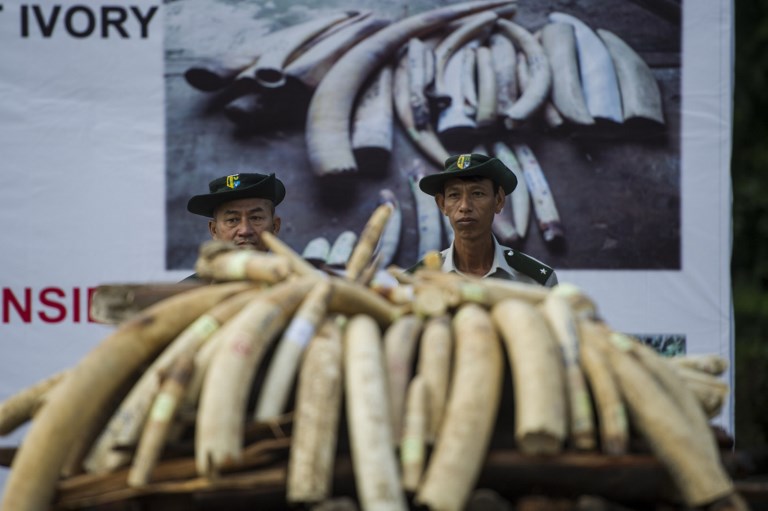Myanmar torches $1.3M of illegal wildlife parts
NAYPYIDAW, Myanmar — Elephant skins, clouded leopard remains and tiger bones were among a $1.3 million haul of illegal wildlife incinerated Thursday in Myanmar’s first ever public event of its kind against the illicit trade.
Trafficking and selling endangered animals is rampant across Myanmar, especially in border areas which serve as a key hub in the $20 billion a year global wildlife trade.
Much of the demand is fueled by a long-held belief in neighboring China that rare animals have medicinal value.
Elephant parts — including chunks of skin — are the most lucrative for poachers in Myanmar.

Myanmar forest rangers stand behind elephant tusks ahead of a ceremony to destroy confiscated wildlife parts in Naypyidaw on October 4, 2018.
Elephant skin, clouded leopard parts and tiger bone were among the hundreds of animal parts worth 1.3 million USD razed on October 4 by Myanmar in the first ever public display of action against its prolific — and profitable — illegal wildlife trade. / AFP PHOTO / YE AUNG THU
Thursday’s ceremony in the capital Naypyidaw saw 850 kilograms of seized contraband set ablaze, including elephant ivory, tiger bone and skin, antelope antlers and pangolin scales.
“Rare wildlife including Myanmar’s elephants, tigers, bears and pangolins are the natural heritage of our country,” Nyi Nyi Kyaw, director general of the Forest Department, said in a statement.
Article continues after this advertisementHe noted an alarming increase in elephant poaching by gangs who have moved from southern Myanmar into the northern and western regions of Rakhine — a migratory path for wild elephants to Bangladesh.
Article continues after this advertisementThe Forest Department would “take action” and confiscate their weapons whenever possible, he added, saying new forensic kits to identify fingerprints from seized ivory would help the crackdown.
Myanmar faces an uphill battle against poachers who rake in cash from its long unregulated wildlife trade, a business which thrives in the lawless eastern periphery and border regions.
Sapai Min of WWF Myanmar said the government is making “good progress in the struggle against wildlife crime”, and pointed to the increase of rangers patrolling poaching hotspots.
But critics say the government has shown a lack of political will to tackle a sophisticated network of criminals who are thought to be armed and funded by powerful “kingpins” in China.
Edwin Wiek of Wildlife Friends Foundation in Thailand said the burning ceremony was timed to coincide with a Convention on International Trade in Endangered Species (CITES) meeting in Russia.
“More important for me is the people involved with the confiscation of the $1.3 million (of wildlife parts) — who were these people, have they been found guilty or fined or given jail terms?” he said.
“If that is the case, then that would show a real change of policy.”
Myanmar is a signatory to CITES, which means that hunting wildlife is illegal in the country. /ee